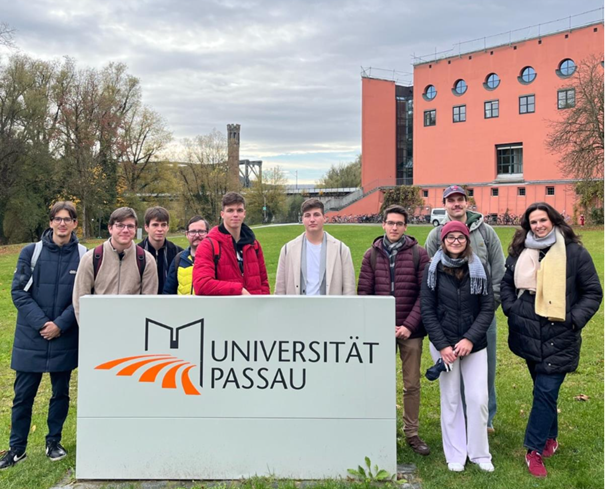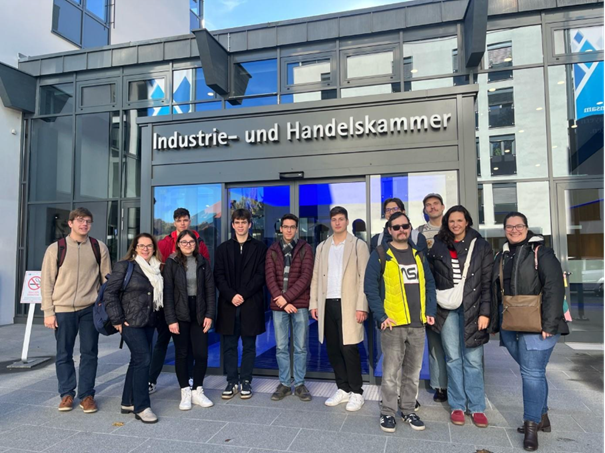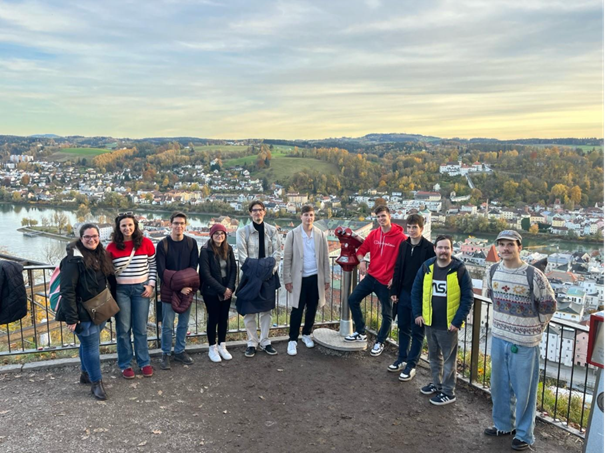Where Texans Love to Travel: Corvinus DSG Students on a Study Trip to Passau

Academic Programs at the University of Passau
The first stop of the study trip was at the University of Passau, where students attended an international marketing lecture. The session focused on corporate strategy analysis and preparing firms for entering international markets. Participants were introduced to several practical analytical models. The lecture emphasized the importance of integrating these tools to gain a comprehensive understanding of a company’s external environment and internal resources, thereby supporting successful international positioning. Students particularly enjoyed experiencing the University of Passau’s multicultural learning environment.
One of the program’s highlights was the visit to the Inn.Kubator startup and innovation center in Passau. The group gained insight into the functioning of the local entrepreneurial ecosystem and the comprehensive support system provided by the center. The presentation revealed that Inn.Kubator not only offers financial support to young ventures but also provides mentoring, networking events, and training opportunities. Special attention was given to supporting AI-based startups, which currently exhibit the highest growth potential.
Visit to the Lower Bavarian Chamber of Commerce and Industry (IHK Niederbayern)
The visit to IHK Niederbayern offered students an overview of the region’s economic structure and the chamber’s key role. The IHK supports local businesses in various areas, including international expansion, taxation and legal advisory services, and vocational training programs.
The presentation highlighted that the regional economy is driven primarily by manufacturing and small to medium-sized enterprises, while both domestic and international tourism also play a significant role. Students learned about the demographic challenges and labor market trends that will shape future economic strategies. In the long term, Germany is expected to face a decline in its working-age population, accompanied by a rising average age. Structural challenges are already evident in Lower Bavaria, including unfilled positions, a shrinking human capital pipeline, and increasing demographic pressure.

CenTouris – Market-Oriented Tourism Research Institute
Students also visited the CenTouris research institute, where they gained insight into an innovation-focused research environment. Established in 2000 and affiliated with the University of Passau, the institute conducts market research and EU-funded projects based on project financing. During the visit, students were introduced to several research initiatives, including studies on AI applications in mobility and experiments focusing on consumer behavior. CenTouris demonstrates how the close integration of academic research and business practice can generate significant regional and economic impact.
City of Passau – Tourism Management Perspectives
To conclude the study trip, students met with Passau’s head of tourism, who gave a professional presentation about the operation and strategic development of the city’s tourism sector. The city official presented Passau’s SWOT-based tourism strategy, built on digitalization, expanding seasonal offerings, and a sustainable “good tourism” approach.
The presentation offered fascinating insights into the economic importance of tourism: Passau records more than 500,000 overnight stays per year, mostly from international visitors on short stays. The typical tourist profile is a 60+ Texan woman arriving on Danube river cruise ships. The city aims to strengthen its competitiveness and tourism revenues by enhancing online communication, expanding its social media presence, and utilizing data-driven marketing strategies.

The Bavarian study trip provided an exceptional opportunity for Corvinus students to experience the functioning of economic, entrepreneurial, and tourism ecosystems in an authentic international setting. The program’s professional diversity—from university lectures and visits to startup centers and regional economic institutions—clearly contributed to the development of the students’ strategic thinking, international outlook, and entrepreneurial mindset.
We express our gratitude for the support of the Pannonia Scholarship Program and the DAAD (German Academic Exchange Service)
Particpants: Cseri Dávid, Érsek Alexandra, Krupp Szabolcs, Márfy Tamás Loránd, Millei Roland Géza, Molnár Bence, Pelbárt Patrik, Soproni-Hartyánszky Ákos, Thén András, Török Boglárka
Faculty supervisors: Dr. Anna Freund, Dr. Loretta Huszák